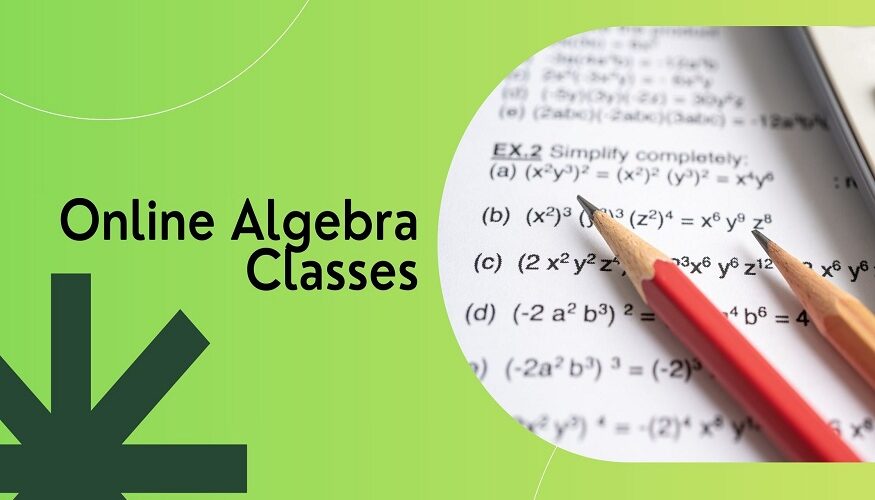As a foundational area of mathematics, algebra frequently presents challenges for students who have trouble with numbers, mental processing, and intricate formulae. This issue grows much more urgent when we consider into account children with limitations who require additional support, acceptance, and tailored teaching techniques. The expression “pay someone to do my online algebra class” is frequently seen on the internet by pupils who find themselves overburdened by the content being covered. This guest post delves further into useful advice for helping students with particular requirements in online algebra courses while maintaining the values of tolerance, flexibility, and diversity.
What Makes Special Needs Students the Center of Attention in Online Algebra?
Although it offers an environment that is adaptable, online education presents particular difficulties to learners with specific needs. These students might have challenges like:
- Difficulty understanding abstract algebraic ideas.
- Trouble maintaining focus in virtual environments.
- Issues with writing, reading, or maintaining focus.
- Requiring more time or assistance technologies.
It is the duty of administrators, associations, as well as educators to offer methods that make algebra approachable. Students who get algebra instruction that accommodates a variety of learning styles develop lifelong critical thinking abilities in addition to arithmetic fluency.
Teaching algebraic equations is only one aspect of education in the digital age; another is establishing welcoming, encouraging, and easily available learning environments where all students, regardless of aptitude, can thrive.
Reduce mathematical concepts down into achievable steps.
Algebra can be frightening because it requires invisible signs and problem-solving techniques. For those with special requirements, breaking difficult tasks down into fewer, easier steps may be helpful. For instance:
- First, determine the variable.
- Separate the variable.
- Make the equation simpler.
- Find the solution and verify.
As they eventually understand mathematics, pupils feel less intimidated thanks to this methodical, systematic approach.
Make Use of Interactive Resources
Compared to training that is solely based on writing, multimedia instruction frequently benefits pupils who have intellectual disabilities more. Instructors can make use of:
- Mathematical explanations using charts and graphs.
- Solution phases that are color-coded.
- Practice with digital whiteboards.
- Algebra tiles and other virtual manipulatives.
These technologies transform difficult-to-understand abstract mathematics into concrete ideas.
Make Use of Adaptable Educational Resources
When taking math lessons online, adaptability is essential. By providing a variety of tools, each student is given the opportunity to study at their own speed. Among the useful resources are:
- Video recording lectures to go over difficult ideas again.
- Practice sheets that can be printed for offline instruction.
- Tests with interactive elements for instant feedback.
Individuals with particular demands can select the material distribution method that best suits their individual learning preferences by broadening it.
Make Use of Helpful Technology
The accessible nature of technological aids is what makes online learning so wonderful. Technology can help children with impairments overcome obstacles and succeed. Tools like
- Screen readers for students with visual impairments.
- Equation authoring program that converts speech to text.
- Audio lectures that explain algebraic principles.
- Applications to solve problems for supervised practice.
There is a lot of promise for online algebra instruction for kids with particular requirements because of technology developments. Algebra will become more interesting and individualized with the help of future-focused technologies like gamified classes, customized learning systems and one can request the expert, please do my class for me as I am having more time to learn the basics. To guarantee long-term availability, organizations need to make investments in these resources.
Promote Involvement
One of the main issues with online learning is participation. Active engagement helps people with special needs children stay focused and understand what they are learning. Teachers can promote participation by:
- Requesting that students work through a problem in modest steps in class.
- Use surveys or tests to promote interactive education.
- Establishing breakout spaces for peer cooperation.
- Teenagers are inspired to take charge of their education when they take a proactive role.
Encourage a Helpful Learning Environment
Students with exceptional needs frequently experience worry and self-doubt over their skills. An setting that is encouraging makes a huge difference. Teachers ought to:
- When kids make progress, give them praise.
- Lessons should not be hurried.
- Establish a secure environment where inquiries are encouraged.
Putting pupils together for group projects is another way to promote peer support. This creates a feeling of community and increases confidence.
Tailor Education to Each Student’s Needs
Since each student is different, education for challenging pupils must be customized. Educators can customize instruction by:
- Supplying extra practice to those who require it.
- Modifying the pace based on the development of the students.
- Relating algebra by using examples from everyday life.
No learner is left behind thanks to personalization, which makes learning purposeful rather than robotic.
Cooperate with the support staff and parents.
In order to guarantee continuity in academic achievement, caregivers, parents, and educational specialists are essential. Frequent interaction between educators and families facilitates:
- Distributing updates on developments.
- Offering actions for repetition that may be done at home.
- Using individualized education plans to coordinate distance learning
Collaborative learners benefit from an excellent support system that guarantees their success in as well as out of the classroom.
Allow yourself greater time and space
Patience is one of the most crucial tactics. Task processing and completion times may be longer to learners with unique requirements. Professors ought to provide students more time for exams and shorter due dates. Understanding, not speed, is the aim. Students are reassured by this patience and are able to concentrate on actual learning.
Maintaining Accessibility While Maintaining Rigor
Algebra’s instructional needs must be maintained while maintaining the topic’s accessibility. Instructors need to strike the perfect balance between keeping the subject matter complicated while making it simpler. For instance:
- Use practical applications to illustrate algebraic concepts, such as figuring out shopping discounts or sports statistics.
- Guarantee that your assignments are challenging but doable so that pupils may develop without becoming exhausted.
Include psychological and social instruction.
learners who have special needs often benefit from mathematics instruction that integrates personality and social competence.
Along with adding to their subject-matter expertise, young ones can develop self-confidence and dedication through cooperative learning, reflective thinking, and conversation..
In what way Can Online Learning Environments Assist Students with Special Demands?
Variety and modification are required when helping students with specific needs in virtual schools. To improve student involvement and learn more about them, use multimedia programs and illustrations in your courses. Offer adjustments such as speech recognition software, hearing aids, and captioning that is closed.
Establish a regular rhythm, monitor their behavior, collaborate with them, and establish an arrangement that works for them in order to reduce stress. Engage in frequent interactions with parents or other adults in charge to engage them, support and motivate kids to demonstrate their skills, and offer a thorough and forceful strategy.
A couple of the primary benefits of a structured setting is that it allows learners to focus on gaining knowledge instead of spending resources figuring out what they want to do and how to do it. Uncertainty or rapid shifts can cause anxiety and negative behaviors, which are lessened by simple demands and predictable patterns.
The educational environment seems more stable and controllable when they are aware of their normal routine, where to obtain homework, and how to make requests for assistance.
In conclusion
Although online algebra classes have a lot of promise, successful outcomes for children with special needs require effective tactics, diligence, and compassion. There are many ways of rendering mathematics more approachable, from encouraging participation and providing endless input to using machine learning and visuals.
For people who frequently feel overburdened and wonder what the best course of action is, should I pay someone to take my online algebra class so that I can be equipped with the right methods, tools, and assistance, or should I keep trying on by myself? Effective studying, after all, is about gaining self-assurance and self-confidence, not about pursuing easy routes.
They can triumph over challenges and achieve educational achievement with the right tools, tailored strategies, and an online community of individuals who are encouraging.

